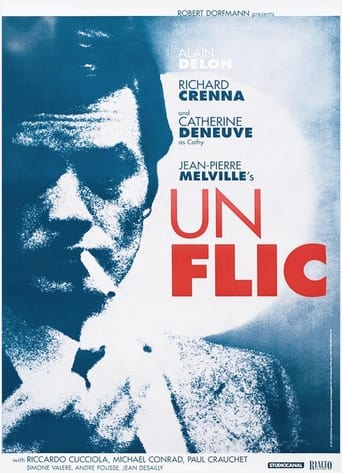rodrig58
It has something of the atmosphere of "Le Samouraï"(1967), directed by the same Jean-Pierre Melville but, it's not at the same quality level. Alain Delon was born to be the villain, not the cop. Catherine Deneuve is beautiful and nothing more. Maybe too blonde. Riccardo Cucciolla is much better in other films such as "Sacco & Vanzetti"(1971), "La violenza: Quinto Potere"(1972) or "Blood on the Streets"(1974)Borsalino and Co.(Original title). The best are the two Americans, Michael Conrad and Richard Crenna. It is the last film signed by Jean-Pierre Melville and unfortunately the worst, his best film of all, in my opinion, being "Le Cercle Rouge"(1970).
jcnsoflorida
Answers the question: How can a film have so much American influence yet be utterly French? If that's an interesting question for you, you have to see Un Flic. Visually it is at times stunningly beautiful. The palette matches Delon's eyes. Seriously. I have no idea if that was intentional or not, but it's hard not to notice. The scene with lame special effects (toy train and helicopter) is problematic not so much because of those effects, but because it's 20 minutes long (1/5th of the movie); however, that scene's sound design is effective. A short scene in what is apparently supposed to be the Louvre looks a bit faux as well. Deneuve's presence on screen is brief but she's the Ice Queen you gotta love. The love triangle is never 'explained'. I'm not sure it needs to be but maybe. Politically incorrect (or dubious) scene of Delon and a male transvestite snitch is justifiable in context. Film is not perfect and not for everyone but I liked it beaucoup.
Eumenides_0
When I saw Le Samourai several weeks ago, I felt disappointment with the incomprehensible behavior of a supposedly-brilliant hit-man. He seemed to do everything to get caught by the police and then the movie ended in contrived fatalism. I hadn't seen such sloppy storytelling and characterization in a while.Were it not for Jean-Pierre Melville's technical skills, I wouldn't have bothered with Un Flic. Fortunately Melville's visual style appealed to much to me I just had to watch more of his movies. After watching Un Flic, I don't regret that decision.Melville not only has improved his technical craftsmanship but his storytelling abilities too. He shoots the movie with a washed-out blue look, in a Paris beset by never-ending rain. It's a dark, cold world, much like his characters, cops, criminals and prostitutes. He takes time to set up scenes, doesn't abuse the editing, allowing scenes to drag out so the viewer can absorb all the details. Even better he doesn't abuse the dialogue; his characters are introspective men of action who communicate with looks and actions. Most of the movie is told through visuals; the dialogue is sparse, succinct and the point.The story itself is ordinary: four robbers heist a bank, one of them gets wounded and is dropped at a hospital This sets up the eventual downfall of the group as they prepare a new heist, unawares that the cops are slowly closing in on them. To make things more complicated, there's an awkward love triangle between the criminal mastermind Simon (Richard Crenna), Cathy (Catherine Deneuve) and Comissioner Coleman (Alain Delon).I don't doubt Alain Delon was the main pull: he was a popular star in France at the time. But he does nothing for me. It's really Robert Crenna, an otherwise mediocre actor in his own country, who delivers an amazing performance as an intelligent, daring, likable criminal who runs a nightclub and organises elaborate heists. Fascinating as he may be, though, I give Melville credit for not glamourising criminals. Following these men around one realises they're lonely, hopeless people who have nowhere else to turn. That's especially obvious in one of the criminals, a 60-year-old jobless husband who lies to his wife about going out to look for work. How distant he is from the modern movie criminals who flaunt themselves as media celebrities.Another thing I give Melville credit for is for making this movie truly fatalistic. in Le Samourai I never thought Jeff Costello had reached the end of the line; he just gives up when he had many ways to get out. But in this movie, Simon knows his end has arrived and still he fights on. For me that's true fatalism, fighting against the certainty of failure.With a renewed interest in Melville's movies, I can't wait to watch the rest of them.
chaos-rampant
This is a film so good, in how it understands the minutiae of film, the mechanics as it were, and done with so much straight-forward conviction that it amazes deeply.It is lean, the form refined, like a piece of wood patiently chiseled by the ebbs.So as with previous Melville films, it is distant, surely cold, clinical business. It's about characters detached from the world they experience, content to glide through without attachments. A world as grey, dreary and sullen as the faces of the characters, one reflected in the other. The pace is minimalist and monotonous, the movie plodding along in a steady and unflagging hypnosis as if it does not progress at all. It seems to hang suspended in the middle distance, the plot laconic in what it reveals as much as the dialogue, yet it flows towards its inevitable and cold end in an unnoticeable succession of undeviating changes. A phone-call, a newspaper clipping, a man setting down to eat in a restaurant. Before you know it a man is getting shot.It's part slow erotic foreplay about cinematic crime, remember the scene with Deneuve and the gun, and part a feel that is the present moment unfettered by any including cinematic baggage. You just watch.



